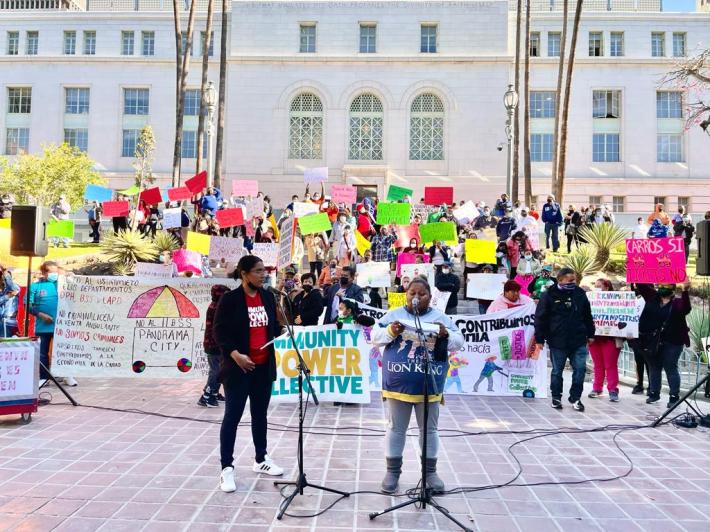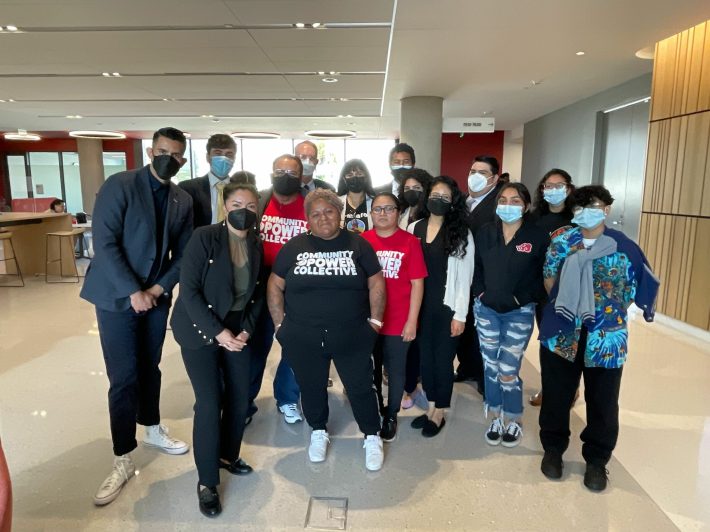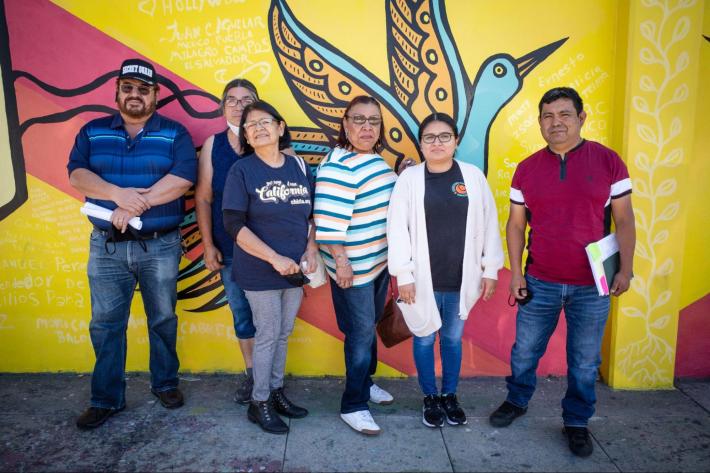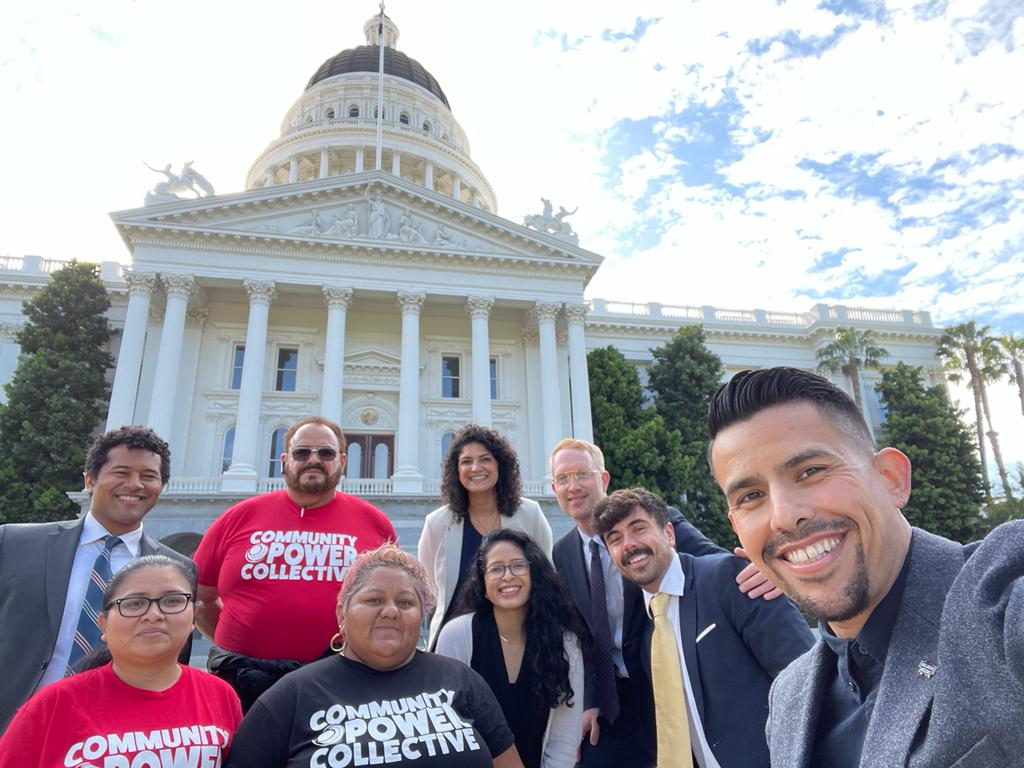Los Angeles street vendors celebrate victory after traveling to the state capital on Wednesday, to show their support for the passage of Senate Bill 972. Their latest effort came yesterday when street vendors from Los Angeles and the organization California Street Vendors Campaign visited Sacramento to share testimonies during the State Senate Health Committee hearing.
The SB972 makes you wonder, as you are biting into your juicy, spicy, and satisfying bacon-wrapped hot dog after a long evening out, have you ever asked yourself what are some of the obstacles that street vendors face when selling some of your favorite street food?
Whether it's that iconic classic bacon-wrapped hot dog topped with caramelized onions that you’re getting at the Santee Alley (Los Callejones) or a juicy taco from your local taquero under the twilight moon and a tarp, unfortunately for food vendors, the obstacles they face in providing delicious and affordable necessities to the community are far too many.
Without a doubt one of the main hurdles is the absence of a proper passage to obtaining the health permit that would allow them to operate legally. Yes, even after street vending was legalized in 2018 and implemented in 2019, street vendors are still continuing to fight for their right to sell food and make a living.
At the hearing, vendors spoke about the importance of passing SB 972, which was introduced by Senator Lena Gonzalez in February of this year and is co-sponsored by Inclusive Action for the City, Community Power Collective, Public Counsel, CHIRLA, and Western Center on Law & Poverty. It’s a bill that proposes to modernize the often described as outdated California Retail Food Code.

“This (the current code) only threatens public safety by further pushing street food vendors into the informal economy and denies economic opportunities to low-income communities, immigrants, women, and people of color and subjects them to an unending cycle of criminalization and poverty,” Senator Gonzalez told L.A. TACO.
For food vendors, the change could also mean an end to the traumatizing health department sweeps, which usually involve their fresh food being thrown away.
“SB 972 will promote greater food safety and improve public health by enabling more sidewalk vendors to participate in a local permitting process that incorporates food safety education and sanitation control,” added Senator Gonzalez.
Sidewalk vendor Merlin Alvarado who sells hot dogs near the Hollywood Walk of Fame spoke at yesterday's hearing in Sacramento. Alvarado became a street vendor nearly 16 years ago after leaving her job at a factory where she said she was exploited. She explained that she was often taken advantage of.
“No había otra opción, tuve que recurrir a la venta ambulante.” “There was no other option, I had to turn to street vending.”
The night before her 7 AM flight to Sacramento L.A. TACO asked Alvarado how she was feeling about yesterday's hearing, she said she felt optimistic and a bit nervous. She shared how she never imagined that she would be advocating for over five years for her right to sell food, at the same time she never thought she would see the day when street vending would be legalized.

“If you would have told me that would eventually happen, I would have laughed,” she tells L.A. TACO regarding the legalization of street vending in Los Angeles. “Pero paso, (but it happened.)”
Now she hopes the same will happen with SB972.
In the last two years, L.A. TACO has reported on how the food code is being used to continue to criminalize street vendors. The code which is followed by all health departments in California has rigorous requirements when it comes to what a vendor's cart should have in order to get a health permit. Requirements range from four compartment sinks to 20 cubic feet of refrigeration among other requirements that simply do not apply to smaller-scale food vendors.
“We continue to be criminalized, the health department comes and throws away our things, and its because the law (CA Retail Food Code) is not an inclusive law, it’s old and written for restaurants,” Alvarado said. “We’re always told to get our permits but we can’t, I sell hot dogs but there is no hot dog cart that is approved by the health department, at least not small ones like mine. So this law needs to change.”
Other vendors like 62-year-old Cesar Benitez who sells aguas frescas in Commerce also joined Alvarado at the State Capital. The Guatemala native began selling aguas frescas after a friend asked if he wanted to take over his stand.
“I hadn't been working because of my age and because I have diverted discs in my lower back, no one would hire me, so I said yes,” Benitez tells L.A. TACO.
His business named “Gourmet Aguas Frescas” has grown significantly since he opened, he has been able to create over 40 different flavors that he rotates each week. However, in the last three years, he said he has had four different scenarios in which the health department showed up unannounced accompanied by law enforcement, and threw away his products. He said he wish he could tell people that the money loss was the only problem but said the events can be traumatizing for them too, and make vendors like him scared to work.
“From what we know, there are not enough commissaries to sustain every street vendor in Los Angeles, this law would give us the possibility to be able to find other ways of storing our carts and preparing our food while following health guidelines.” - Cesar Benitez
“Honestly it affects us emotionally too because it's hard seeing them throw away what costs us so much work,” he said at the hearing. “The bad thing is there is no real exchange of information when this happens, they give you a paper and expect you to understand everything.”
Because of these encounters, Benitez has had to cut down to only opening his stand three days a week, as opposed to the five days a week he used to work. This schedule change out of fear comes as the inflation-led cost of living in Los Angeles continues to go up, especially for working-class individuals like Benitez.
When street vending first became legalized Benitez was one of many vendors who began to look into what he needed to legally sell. He said when speaking with the health department he was told that he would need a specific cart designed for his fruit-infused waters. So he solicited a cart from a manufacturer listed on a paper he was given by the health department, but two years have passed, and a total of $3,000 was invested in his cart and he still hasn't received it. He added that this is just a glimpse into some of the barriers and challenges food vendors face when trying to acquire a health permit.
Another issue Benitez brought up was the lack of commissaries for vendors in L.A.
“From what we know, there are not enough commissaries to sustain every street vendor in Los Angeles, this law would give us the possibility to be able to find other ways of storing our carts and preparing our food while following health guidelines,” he said.

According to Inclusive Action for the City, there are only 28 food cart commissary spaces in L.A. County. Thankfully, changes included in the bill supported by street vendors yesterday also propose to change the Microenterprise Home Kitchen and the Cottage Food Operation which would allow vendors to prepare food outside of commissaries. Instead, they would be able to prepare food at home or in approved kitchens.
Although it is not the end of the fight Wednesday’s approval is a big win for vendors. In the end, they said all street vendors want is to be able to continue bringing tradition, culture, and delicious food to their communities in a safe and legal way.
At the hearing, street vendors brought up these issues and vendors from across California and advocates showed up in person and called one by one to support SB972. The bill got all nine votes and is now moving to the Senate Appropriations Committee for further debate, if passed it will allow the bill to continue through the legislative process.
“These vendors have been part of the fabric of our communities, we want to make sure that they are operating within the law which is why we’re here,” said Senator Susan Rubio. “We have to give them the ability. There's a lot of red tape and they're just trying to do the right thing and if we don’t help them then we’re at fault.”
Although it is not the end of the fight Wednesday’s approval is a big win for vendors. In the end, they said all street vendors want is to be able to continue bringing tradition, culture, and delicious food to their communities in a safe and legal way. In Alvarado’s case, the news makes her reflect on the fact that they have had victories in the past, and in her eyes, this fight will be won.
“I want to say thank you to everyone who supports us and to all street vendors don't give up, we legalized street vending once, we can do this too. Changing this law will happen, maybe not today or tomorrow but I am certain it will happen, don't stop fighting.”






